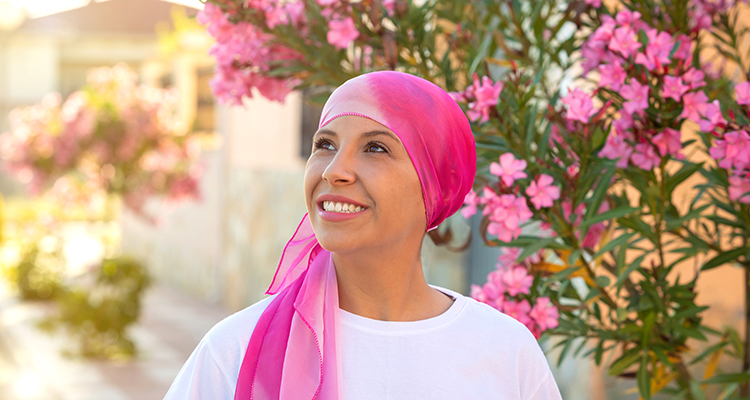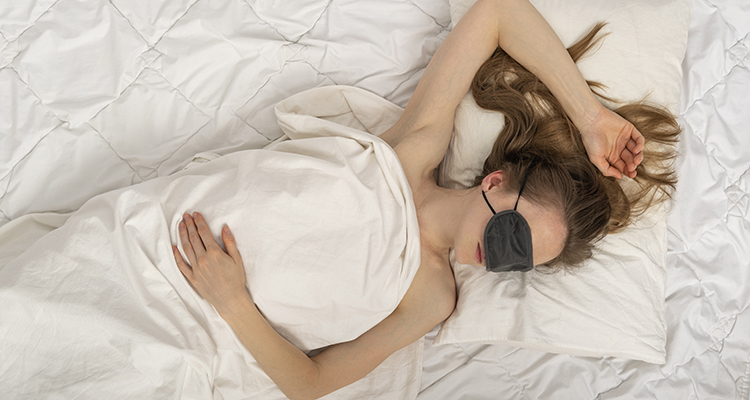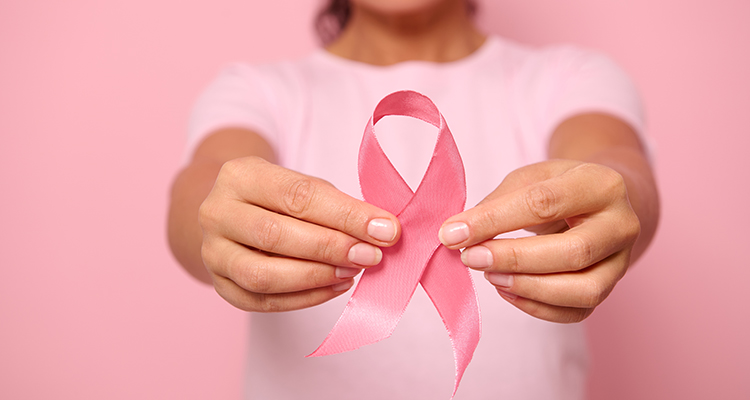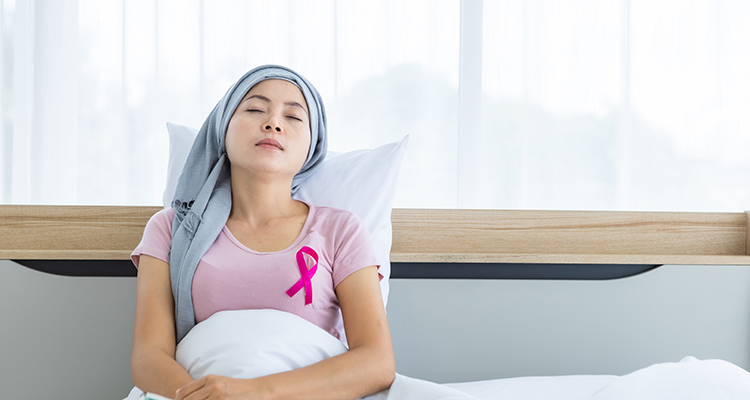How Cancer and Insomnia are Connected
Cancer. It’s the one word most people fear when receiving a medical diagnosis. But with continued advancements in treatment and technology, more and more people are outliving their initial prognosis and leading full, long lives. That’s not to say that cancer isn’t a serious condition and must be treated as such.

There are currently over 100 types of cancers that affect patients of all ages, genders, and walks of life. Some are more serious and aggressive than others and many come with unpleasant side effects. Many side effects are also attributed to chemotherapy, radiation, and other medication.
Although some cancer patients report feeling extreme fatigue and overall lethargy, others struggle to achieve quality sleep. In this article, we’ll take a closer look at how cancer affects sleep and insomnia treatment options for those who find it difficult to fall and stay asleep since receiving a cancer diagnosis.
Content
The Relationship Between Cancer and Sleep
Nearly 20% of the adult population will be diagnosed with cancer at some point in their lifetime. And this percentage is predicted to rise as the population gets older. While cancer comes in a variety of forms and severities, the basic cause is the abnormal growth of cells that invade tissues in the body. Each form of cancer affects the body differently and comes with its own set of symptoms, dangers, and side effects.

The relationship between cancer and sleep is a complex one and many scientists believe it is multifaceted. While sleep disorders and long-term sleep problems increase a person’s risk of developing certain types of cancer, lack of sleep can negatively impact survival rates and the effectiveness of certain cancer treatments. Cancer may also cause long-term physical and mental changes that interfere with sleep. These changes may continue to impact cancer survivors long after they enter remission.
While you can’t prevent cancer, addressing sleep problems and improving sleep quality may reduce your risk of a cancer diagnosis and improve overall health – both physical and mental. Additionally, cancer patients who get quality sleep are stronger physically, mentally, and emotionally which may help them better deal with their diagnosis and adopt an optimistic outlook.
Triggers of Sleep Trouble in Cancer Patients
Studies show that nearly half of all cancer patients report trouble sleeping. The two most common difficulties reported are insomnia (trouble falling and staying asleep), and a misaligned circadian rhythm.

There’s no single cause of these sleep problems, but several common triggers include:
- Physical changes (surgery, pain, etc.)
- Medication, drug, and treatment side effects
- Extended hospital stays
- Stress, depression, anxiety following diagnosis
- Other health conditions not associated with cancer
- Tumors
- Infection or fever
- Disrupted sleep schedule
Physical Changes
Cancer patients undergo a myriad of physical changes including headaches, increased pain, and weight loss. If the type of cancer you’re facing involves removing a tumor or another type of surgery, the recovery from this procedure can also impact your ability to get a quality night’s sleep.
Drugs and Medications
Many cancer patients receive an intense regime of different drugs and medications to both treat their condition and ease other symptoms. Unfortunately, these medications come with their own set of side effects and risk factors, including disrupted sleep. For example, hormone therapy, chemotherapy, radiation, antidepressants, sedatives, corticosteroids, and anticonvulsants can all cause sleep troubles.
Hospital Stays
If you’ve ever been admitted into the hospital for any length of time, you know that getting a quality night’s sleep is tough. Not only are nurses and doctors constantly entering and exiting the room administering tests and checking your vitals, but hospital hallways and roommates can all disrupt your natural sleep patterns. Being in an unfamiliar sleep environment where you can’t control things like sound, light, and temperature can also trigger insomnia and other sleep disorders.
Stress and Anxiety
To say a cancer diagnosis may cause some stress is an understatement. In one word, your life completely changes. The thought of treatment and death can cause extreme stress, anxiety, and even depression in many cancer patients. While this is completely understandable, these mental and emotional disorders are also common triggers for insomnia and trouble sleeping.
Anxious thoughts and stress over your diagnosis and how it will negatively impact your life can make it impossible to relax enough to fall asleep. Lack of sleep can worsen these feelings and cause increased anxiety, creating a vicious cycle of worry and sleep troubles.
Other Health Conditions
Some cancer patients experience trouble sleeping due to other physical health issues that aren’t connected with their cancer diagnosis. These include snoring (sleep apnea), headaches or migraines, gastrointestinal issues, seizures, and chronic pain.
Tumors
Cancerous tumors can cause their own symptoms and side effects that drastically impact sleep, making it difficult to get comfortable or relax enough to fall asleep. These include:
- Difficulty breathing and coughing
- Fever
- Chronic pain or pressure from the tumor
- Gastrointestinal issues (nausea, diarrhea, constipation, etc.)
- Bladder issues (increased urination)
While some patients experience relief once the tumor is removed, they then must recover from the surgery itself. This may involve an extended hospital stay also – two more common causes of insomnia.
Infection or Fever
Many types of cancer weaken your immune system, putting you at increased risk for developing other infections and illnesses. These conditions cause a myriad of side effects including night sweats, chills, nightmares, difficulty finding a comfortable sleep position, and waking frequently. Fevers are also common among cancer patients and may trigger some of the same symptoms, causing sleep disruptions and poor sleep quality.
Disrupted Sleep Schedules
In addition to changes in your circadian rhythm, daytime fatigue and the increased desire to nap can also trigger sleep troubles in cancer patients. Many patients report feeling tired or worn out during the day, leading to long afternoon naps. While in some cases, a short nap can help you feel more awake and alert, longer naps or ones that are taken later in the day can interfere with your ability to fall and stay asleep at night.
Certain medications and cancer treatments can increase daytime drowsiness, making it difficult to avoid naps and creating a negative cycle of sleeping during the day and being awake at night.
How Does Sleep Affect Cancer?
We’ve already covered how cancer can negatively impact your sleep patterns, but how exactly does lack of sleep affect your cancer diagnosis, treatment, and recovery? Sleep is a vital part of overall health, wellbeing, and body function. It affects everything from hormone regulation to metabolism, your immune system, and brain health.

Research shows that lack of sleep may also increase your risk of developing certain cancers. That’s because your cells can’t function properly without adequate sleep. Insomnia and other sleep disorders may interfere with how cells interact and grow within your body.
Let’s take a closer look at how sleep may affect not only your risk of developing cancer but also its progression and the effectiveness of treatment.
Do Sleep Disorders Increase Cancer Risk?
Research suggests that several sleep factors can increase your risk of developing cancer. These include your circadian rhythm, certain sleep disorders including obstructive sleep apnea (OSA), duration of sleep, and overall sleep quality.
Circadian Rhythm
Your circadian rhythm (or sleep-wake cycle) is an internal clock that helps regulate your bodily functions over a 24-hour period. A specific part of your brain known as the SCN (suprachiasmatic nucleus) sends signals to different cells in your body, regulating your activities during certain times of the day.
Light is one of the key factors in maintaining a balanced circadian rhythm since your body’s internal clock was once regulated strictly by the rising and setting of the sun. This is one reason light therapy is so effective in treating insomnia. Exposure to natural or artificial sunlight at specific times of the day can help realign your circadian rhythm, helping you feel awake and alert during the day and tired at night when it gets dark. With the increased use of digital devices and artificial light, disruptions in your natural sleep-wake cycle are increasingly common.
A larger number of people are also adopting shift work schedules that include working late or overnight. This drastically affects your circadian rhythm since you’re now awake and alert at night when you’re supposed to be sleeping. Many shift workers struggle to achieve quality sleep during the daytime hours or even on days off. Research shows an elevated risk of cancer in these individuals.
Growing evidence suggests that these disruptions may play a key role in cancer development. That’s because your circadian rhythm affects how cells grow and divide inside your body. It may also trigger mutations and damage to your DNA. A misaligned circadian rhythm can also impact your immune system, metabolism, and healthy hormone production. Some of the most common types of cancer associated with circadian rhythm sleep disorders include breast, ovarian, lung, colon, liver, and pancreatic.
Obstructive Sleep Apnea (OSA)
Obstructive sleep apnea is one of the most dangerous sleep disorders since it causes repeated lapses in breathing, reducing how much oxygen reaches your blood, brain, and other organs. This condition is known as hypoxia. Research suggests that OSA may be a contributing factor to cancer.
Based on certain studies, hypoxia from OSA and persistent sleep interruptions could accelerate the growth of potentially cancerous tumors. OSA also creates negative sleep hygiene that may be conducive to cancer production. Other symptoms of OSA may negatively impact your immune health, making it increasingly difficult to attack potential cancer cells. These include systemic inflammation, oxidative stress, and fragmented sleep. Many types of cancer tumors exhibit low oxygen levels, indicating hypoxia caused by OSA may contribute to the development of these cancerous tumors.
The most common types of cancer associated with OSA are breast, uterus, thyroid, prostate, lung, kidney, and melanoma. OSA is also linked to other health issues that may impact sleep including diabetes, obesity, and heart disease.
Sleep Duration and Cancer Risk
The research on sleep duration and cancer risk are still ongoing, with some researchers indicating a direct correlation while others are still undecided. It’s recommended that adults get between 7 and 9 hours of uninterrupted sleep. Sadly, more than 50% of people worldwide report not sleeping long enough.

Certain studies suggest that adults who sleep less than six hours per night are at higher risk of developing cancer and also have a higher mortality rate. Sleep duration is connected to certain types of cancers more than others including colon, stomach, thyroid, bladder, head, neck, and Non-Hodgkin Lymphoma.
One animal study showed that increased sleep deprivation is connected to greater strain on cells which can lead to DNA damage. Insufficient sleep is also strongly related to obesity, persistent inflammation, and other immune system issues which are all considered risk factors for cancer.
It is, however, interesting to note that some studies indicate too much sleep can put you at greater risk of developing cancer. Research in one study showed that individuals who slept more than 9 hours per night may elevate colorectal cancer in elderly patients. Snoring and obesity added to these risks. Long sleep duration may also be associated with an increased risk of liver and breast cancer in some people.
Can Sleep Quality Impact Your Cancer Risk?
In addition to how long you sleep (duration), the quality of your sleep may also impact your risk of developing certain cancers. The problem is, sleep quality is subjective and may look different for everyone, which is why determining this connection may be difficult.
Fragmented sleep, like that associated with OSA, can trigger certain types of inflammation which are associated with tumor growth and progression. Some studies suggest that individuals who report poor sleep quality are at a higher risk of cancer. Another study indicated a connection between triple-negative breast cancer and restless sleep. This type of breast cancer is extremely dangerous and aggressive. Men with poor sleep quality were also at greater risk of developing prostate cancer.
The Impact of Sleep on Cancer Progression
While sleep, or lack thereof, may put you at increased risk of developing cancer, it may also affect how quickly cancer progresses and grows. Factors include how sleep impacts hormone production, inflammation, and metabolic function.
Lack of sleep isn’t always the problem. As one study indicates, women with breast cancer who sleep more than 9 hours per night were at higher risk of dying. One study, however, did indicate that a misaligned circadian rhythm may trigger a relapse or recurrence of breast cancer following remission. Sleep duration in colorectal cancer patients also indicated that shorter sleep duration meant an increased risk of mortality. OSA patients may see an accelerated cancer progression since hypoxia and fragmented sleep makes it easier for cancerous tumors to metastasize to other areas of the body.
How Sleep Affects the Effectiveness of Cancer Treatment
Sleep quality and duration after starting cancer treatment may impact your recovery time and how well your body responds to treatment.

In some instances, a synchronized circadian rhythm has been attributed to more effective cancer therapies. We already mentioned that cell growth and division are directly affected by your internal clock. Because of this, certain cancer cells may be more receptive to treatment depending on when it’s given. Most cancer drugs target certain receptors, enzymes, and proteins, all of which are affected by your circadian rhythm.
Doctors and scientists are constantly working to uncover new, more advanced ways of treating cancer. One such treatment is chronotherapy which works to optimize the results of radiation, chemotherapy, and immunotherapy based on your circadian rhythm. The goal is to kill more cancer cells while limiting the damage done to healthy cells and tissue. Other drugs are being developed that use the science behind your circadian rhythm to better fight and treat certain forms of cancer. These drugs work to manipulate cell growth that is part of your body’s circadian timing.
Quality sleep may also affect how well you respond to and recover from certain cancer treatments. Poor sleep increases your level of pain, risk of complications, and may result in longer hospital stays – all of which can worsen insomnia symptoms. Women with breast cancer also face a greater risk of complications during and after surgery.
OSA can also impact how well your body responds to certain cancer treatments and drugs, making them less effective. Certain types of radiation and chemotherapy work best when oxygen levels in the tumor are high. Because hypoxia decreases the amount of oxygen that reaches your cells, tissues, and organs, OSA may prevent these cancer treatments from working efficiently.
Sleep Quality Post-Recovery
Sleep is still essential for cancer patients once treatment ends and remission begins. A cancer diagnosis is a life-long event that will create significant, long-term changes – both physical and emotional. Many cancer survivors list sleep as one of the most important factors in maintaining overall health and wellbeing. Unfortunately, as many as 80% of cancer survivors report above-average sleep difficulties years after diagnosis and treatment.
It’s interesting to note that childhood cancer survivors have an increased need to maintain healthy sleep hygiene. That’s because cancer treatment starts at a much younger age, extending the time patients must deal with long-term side effects – both physical and mental. By maintaining quality sleep, patients can enjoy a stronger, healthier immune system and better quality of life. One way to support a healthy, promising future during recovery is to create a wellness plan that includes plenty of exercise, a healthy diet, follow-up visits to your doctor, and a healthy sleep routine.
How to Achieve Better Sleep in the Face of Cancer
If you’re one of the millions of people facing a cancer diagnosis, sleep is crucial for your overall health and wellbeing. Without adequate sleep, treatment may not work as well and it may take longer for you to recover from surgeries and other infections. Similarly, poor sleep quality may increase your risk of developing cancer.

In a world where you’re either facing a cancer diagnosis, are currently in remission, or know someone who is, maintaining good sleep hygiene has never been more important. Here are a few ways to support quality sleep to prevent cancer and also to ensure you get the most out of your cancer treatment and recovery journey.
Set a Sleep Schedule
Your circadian rhythm is one of the first things impacted by cancer. It’s also responsible for synchronizing your internal clock, helping you fall and stay asleep. By setting a consistent sleep schedule and sticking to it, you can help align your internal clock, combatting some of the negative impacts of both cancer and cancer treatment.
Try going to sleep at the same time every night and waking at the same time each day. This can be difficult when facing extreme fatigue or daytime drowsiness. Start your day with things like light exposure and physical activity to help better prepare you for sleep at night.
Create a Comfortable Sleep Environment
Physical pain and overall discomfort are common for many cancer patients. Post-surgery recovery can also cause extreme pain, making it difficult to find a comfortable sleeping position. While you may not be able to control your environment during hospital stays, you can create an oasis for sleep at home.
Invest in a comfortable mattress and pillows that offer adequate support. Quality bedding can help you maintain optimum body temperature, preventing night sweats, hot flashes, and chills. Reduce outside distractions using room darkening shades, a sleep mask, and a sound machine.
Adopt a Healthy Diet
Your diet plays an important role in not only your overall health and wellbeing but also your weight, sleep hygiene, and risk of developing cancer. Avoid obesity by eating plenty of fruits, vegetables, lean proteins, and whole grains. In addition, avoid foods high in saturated fat and sugar. Doing so will help you maintain a healthier weight and give you increased energy.
There are countless carcinogens in the foods and drinks we eat. While there’s no guarantee that consuming these products will cause cancer, be mindful of how much and how often you eat or drink the following items:
- Processed meat
- Sugary drinks and non-diet sodas
- Red meat
- Salty fish
- Alcohol
- Processed foods and fast food
Get Plenty of Physical Activity
A balanced diet and physical activity go hand-in-hand with maintaining a healthy lifestyle. While it can be difficult for some cancer patients to exercise regularly, engaging in even low-impact or mild exercise can help keep you healthy – both physically and mentally. Try taking a walk, bike riding, or even gardening. Getting outdoors is great for your mental wellbeing and also delivers a much-needed dose of vitamin D.
Physical activity also releases endorphins that help trigger feelings of calm, relaxation, and happiness. This is vital for cancer patients experiencing depression, anxiety, or extreme stress.
See Your Doctor Regularly
Prevention and early detection are key when discussing cancer. By seeing your doctor regularly, you can catch any early warning signs of cancer. This is especially important if you’re predisposed to certain types of cancer or if cancer runs in your family.
Go for annual check-ups, routine blood work, and always discuss any questions or concerns with your doctor. Mention any changes in your current sleep habits, appetite, and overall sense of wellbeing. These are all potential signs that something isn’t right. You know yourself best. Listen to your gut and don’t be afraid to speak up. If you’re facing insomnia or other sleep troubles due to your current cancer diagnosis, your doctor may suggest sleep aids or other treatment options.
Facing Cancer with Confidence
A cancer diagnosis is undeniably a very serious and traumatic event. Advances in technology and treatment are helping more and more cancer patients heal, recover, and go on to live full, happy lives. Whether your cancer is in remission, you were recently diagnosed, or you’re looking to prevent a future issue, achieving quality sleep can help.

The experts at Somnus Therapy are ready and willing to help you every step of the way. With a variety of therapy and treatment options you can use in the privacy and comfort of your own home, improving your sleep quality and hygiene has never been easier or more effective.
Click here and start your journey toward more blissful sleep today.













